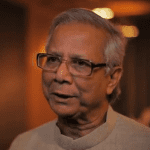 Apologies are never easy because they unmask our failings. I am not above recognizing my mistakes–and my organization’s mistakes–while trying to help lift people out of poverty.
Apologies are never easy because they unmask our failings. I am not above recognizing my mistakes–and my organization’s mistakes–while trying to help lift people out of poverty.
Sometimes our “help” has turned into hurt. Unintentional, perhaps prideful, mistakes have been made. And for those mistakes, I apologize.
I think it is important to approach new solutions with the humility that comes from failure–from the recognition that our unintended consequences have hurt those we’ve tried to help. We’re not just picking new strategies, we’re embracing new philosophies as well. Philosophies that put the role of local community leadership at the center, with us Westerners invited in as partners–not anti-poverty colonizers.
Because of our relative wealth, strength, and competency, it is dreadfully tempting to think we’ve got it all figured out and if developing nations would just listen better, or “get it,” we could really do some good.
Wrong, wrong, wrong.
How can we say, “We know what is best,” when all we have done is take a few trips or read a few books or heard a sermon or went to a conference?
Right now there is a convergence of ideas that I think are forming a simple equation:
+ Community-to-Community Partnerships
+ Local Leadership Leading First
+ Compassionate Short-Term Intervention
+ Economic Development Activity
= End of Poverty
While many have pursued pieces or parts of this equation, I am seeing a great convergence of thinkers, practitioners, ministries, NGOs, and governments espousing this basic framework.
We’ll keep unpacking the specifics of this through this series of articles. Your feedback is welcome always.

